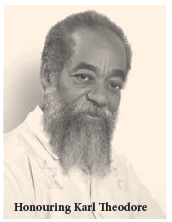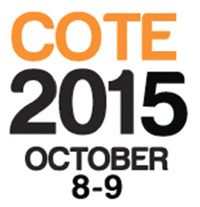|
October 2015

Issue Home >>
|

 The annual COTE 2015, organized by the Department of Economics, is on from October 8-9 at The UWI, St Augustine Campus. Findings from quality research by academic staff, research students and other collaborators are presented on economic and social policy impacts. This year, the conference honours former Head of Department and Current Director of the Centre for Health Economics, Professor Emeritus Karl Theodore, and will explore the theme Managing Development in Caribbean Economies: The Key Role of Health, Public Policy and Social Security, consistent with Professor Theodore’s research output. The annual COTE 2015, organized by the Department of Economics, is on from October 8-9 at The UWI, St Augustine Campus. Findings from quality research by academic staff, research students and other collaborators are presented on economic and social policy impacts. This year, the conference honours former Head of Department and Current Director of the Centre for Health Economics, Professor Emeritus Karl Theodore, and will explore the theme Managing Development in Caribbean Economies: The Key Role of Health, Public Policy and Social Security, consistent with Professor Theodore’s research output.
Roxanne Brizan-St. Martin, an Instructor in the Department of Economics, talks about Professor Theodore and his drive to create a culture of efficiency in our Caribbean economies.
Quoting from Sir Arthur Lewis, Professor Karl Theodore believes that “good economics begins with a concern for the conditions under which people live.” For him, economics is meant to serve society by examining factors that affect the welfare or quality of life of the population – issues of efficiency, effectiveness and equity.
This concern for people, and the conditions under which they live, inspired his interest in developmental initiatives in the region, particularly as it relates to health, and public and fiscal policy. He saw the reality in the region as one of “fiscal sensitivity.” Simply put, when the government experiences hard times, the system suffers. In his opinion, addressing hard times does not necessarily mean more funds but, rather, finding innovative ways of maximizing resource efficiency and effectiveness. It is about “creating a culture of efficiency.”
 His drive to create a culture of efficiency is evident by various technical collaborations with organizations such as the World Health Organization and the Pan American Health Organization on issues of health financing, social security systems, and costing and financing of health services, in his capacity as the Director of the Centre for Health Economics at The UWI. His work focused on finding new ways to align health system objectives with government priorities, particularly with respect to health financing in the Caribbean. Professor Theodore recognized that one of the main issues affecting the performance of healthcare systems in the region is the ever-increasing cost of healthcare and the sustainability of health financing. His drive to create a culture of efficiency is evident by various technical collaborations with organizations such as the World Health Organization and the Pan American Health Organization on issues of health financing, social security systems, and costing and financing of health services, in his capacity as the Director of the Centre for Health Economics at The UWI. His work focused on finding new ways to align health system objectives with government priorities, particularly with respect to health financing in the Caribbean. Professor Theodore recognized that one of the main issues affecting the performance of healthcare systems in the region is the ever-increasing cost of healthcare and the sustainability of health financing.
“The calibre of health systems,” he said, “is being severely threatened by the universality requirement embodied in the drive to universal health coverage as well as by the response to the Chronic Non-Communicable Diseases.”
There is a need for health reform. That is, a purposeful and fundamental cultural change that effectively links sustainability and efficiency with an appropriate financing mix and policy formulation.
|





